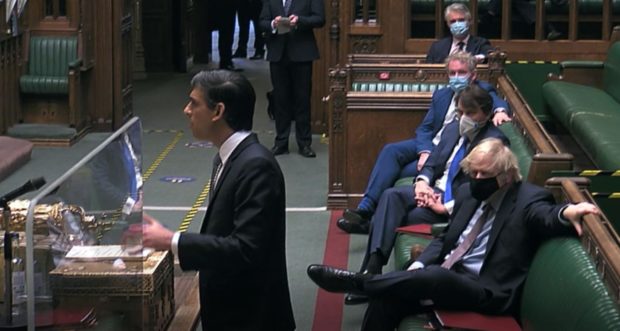Millions of people will be worse off with rising costs and tax increases in the Chancellor’s Budget, economists warn.
Experts poured over the fine print of Rishi Sunak’s spending plans one day after he proclaimed a “new age of optimism”.
His spending plans include millions of pounds of investment in Aberdeen, Inverness, and Perth and Kinross.
Mr Sunak also boasted £4.6billion for the Scottish spending.
He cut air taxes – welcomed by business and Aberdeen airport but condemned by greens.
And he will increase the minimum wage.
‘Real pain’
However, in a report the day after, the Institute for Fiscal Studies (IFS) said the poorest face “real pain” and middle earners will lose out.
Director Paul Johnson said living standards for many will fall with high inflation, rising taxes and poor growth being “undermined more by Brexit than by the pandemic”.
His warning came as the Resolution Foundation said the poorest fifth will be around £280 a year worse off.
This damning analysis confirms the Tory government has left millions of Scottish workers, families and pensioners worse off.
David Linden MP
The SNP’s work and pensions spokesman David Linden MP said the Budget is falling apart.
“This damning analysis confirms the Tory government has left millions of Scottish workers, families and pensioners worse off – as Tory cuts, regressive tax hikes and the soaring cost of Brexit take hundreds of pounds out of people’s pockets,” he said.
Mr Sunak, announcing the Budget, said: “The prime minister’s economy of higher wages, higher skills and rising productivity, of strong public services, vibrant communities and safer streets.
“An economy fit for a new age of optimism, where the only limit to our potential is the effort we are prepared to put in, and the sacrifices we are prepared to make.
“That is the stronger economy of the future, and this Budget is the foundation.”
Taxes higher
After the Budget, experts said taxes will reach the highest level since the post-war recovery in 1950 and be £3,000 higher for the average UK household compared with when Mr Johnson became Prime Minister in 2019.
That was coupled with a forecast that the weakest decade of pay growth since the 1930s, combined with rising inflation, means real wages are set to fall again next year.
With the possibility of inflation hitting the highest level in three decades, the IFS director warned “millions will be worse off in the short term”.
“We are not at 1970s levels of inflation but we are now experiencing enough inflation that real pain will be felt as low-income households – most of whom have little in the way of financial assets – wait more than a year for their incomes to catch up,” he added.
“For some in work that may never happen.”
